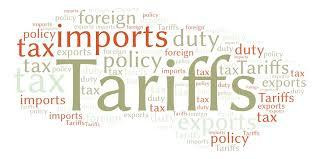It's time to talk about tariffs, and what it means for pricing
It's Time to Talk Tariffs.
(This one's a little long - TL;DR: at bottom).
The last thing I want to do is take political sides, so I won't. But there is a stark reality in world trade right now: the current US government administration's on-again/off-again tariffs have created massive instability in world trade, and will, it seems, have resounding effects on the US economy.
On a more micro-economic level, it means things are already starting to get more expensive for us, which means (unfortunately) they're going to start getting more expensive for you.
Some have said (or implied) that tariffs are "paid by the country supplying the goods." Unfortunately, this could not be further from the truth. A Tariff is an import tax paid to the US government - and it's charged directly to the person/company doing the IMPORTING, which would be the company (in the USA) that is receiving the goods. That tariff - basically a TAX - quite simply adds to the acquisition costs of that particular item.
So, let's work through a simple example: my distributors get a huge container of strings from Europe that's worth $500,000. They paid for those strings (and a separate bill for shipping costs across the ocean) when they were shipped. So the manufacturer in Europe and the shipping company both got paid for their goods and services - and they're both completely out of the equation now.
However, for that shipment to "clear port" and be delivered to the distributor's US headquarters, they now have to pay an additional 10% (or other amount, depending on the country the strings came from) to the government. Again, it's a TAX. So they have to write another fat check for $50,000 - meaning that now their total acquisition cost has become $550,000 ($500k to the manufacturer, plus $50k to the US Government, not including shipping costs).
Here is about the only place in economics that using a term like "trickle down" is actually valid - but it's not in a good way. The extra costs for them to get those strings in hand means that they now have to raise the cost that they charge me for those strings.
So, to continue the exercise using ficticious costs/prices: let's say these European strings previously cost me $225 per set before, and I sold them for $265, making a profit of $40 (minus free shipping, and another 3-4% for credit card processing costs, shipping supplies, etc). For the sake of simplicity, though, let's say that I'd be making a profit of around $40. But now, with the new tariffs applied, they cost me almost $250 per set (10% more). So, if I sell at my "old" price, my margin was just reduced by more than half, and with those other costs, I might only just break even on the set once I send it to you. So now I have to raise my retail price to around $300 to maintain a similar profit margin as before.
And that's with a 10% tariff. As of this writing, the U.S. import duties on Chinese products now stand as high as 145% (!) So the thing that previously cost $1,000 now costs $2,450 (!!!) Just try to imagine what that will do to the cost of Chinese made basses, large cases and bags, bows, and other bass accessories made there. I shudder to think. But as of right now, it's coming. Fast.
As you can see, it affects everyone along the line.
I've received emails from most of my suppliers and manufacturers, all expressing regret and telling me that prices, at least temporarily, are expected to be on a significant rise pretty imminently. But all of them express the hope that the prices will return to (or close to) previous pricing if/when the tariffs are reversed, or at least reduced.
For instance, I've already posted the new pricing for NS Design basses and accessories (though the price change doesn't go into effect until June 1, so if you've been thinking about getting one, now might be the time!) There's also an imminent price increase (of, as you might expect, around 10%) for Thomastik strings coming. Other manufacturers expected to be affected include Pirastro, Gold Tone, Headway, Jargar, Lenzner, Terller, Wittner, Tonareli, On-Stage, Juzek, and probably our own products like Estle Louis Basses, Gollihur Bass Bags, and our house brand Brazilwood and Pernambuco bass bows, among other things.
And yes, that means that our pricing will likely have to echo those increases. And some of those changes may be unexpected, sudden, and - for some Chinese-made goods, at least - substantial. Just know that we're holding off on price changes wherever possible, and only raising prices when we absolutely have to (some price changes are mandated by the manufacturers, and some others we simply have to do for financial reasons.)
We apologize for this instability and uncertainty, and hope that you know that we're doing our best to lessen any impacts, and hoping for the return of relative normalcy.
As always, I truly appreciate your understanding and patience in this somewhat unprecedented world trade environment.
TL;DR:
- The US Government is charging significant import taxes (aka "Tariffs") to companies who bring in goods from other countries.
- Those import taxes are paid by the US-based company doing the importing, NOT the foreign company or country the goods came from.
- These taxes significantly increase the costs of importing those goods.
- The increased costs, logically, increase the prices they charge to me (and other retailers.)
- My increased acquisition costs result in higher selling costs to you, the consumer.
- This sucks, and I hate it - and I sincerely hope a return to normalcy is on the horizon.
Recent Posts
-
Pirastro's Perpetual Bass Strings - Do I want Stark, Medium, or some combination?
I just spent the time writing this up to post in a thread at Talkbass, so I figured I'd also share i …Nov 12th 2025 -
Preserving our Humanity
Our site has a very distinctive style and flow. And that comes from our longtime dedication to being …Sep 3rd 2025 -
What can Brown do for you? Nothing good, at least lately.
I really don't think I've ever publicly called out any other companies, so this is a first. But I've …Aug 13th 2025




